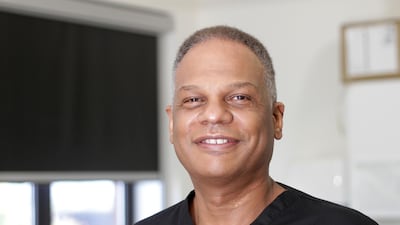Tributes poured in Monday for three doctors - including two of Sudanese background - who made the “ultimate sacrifice” after they died from coronavirus as Britain’s medics put up a frontline fight against the pandemic.
Consultant Amged El Hawrani, an ear, nose and throat specialist, lost his life on Saturday after working on the wards to help deal with the virus outbreak.
His death follows the passing of Sudanese London-based surgeon Adil El Tayar, who was volunteering in another facility in the English Midlands. Dr Habib Zaidi, who had a Pakistani background, who also died after contracting coronavirus.
It comes as heads of the UK’s National Health Service (NHS) face mounting criticism for failing to provide adequate equipment to protect staff.
The family of 55-year-old Dr El Hawrani thanked his NHS colleagues for working "tirelessly" to save him.
“Most of my dad’s time was dedicated towards his family and the rest of that time was dedicated towards his profession,” his son, Ashraf, said.
“He taught me the significance of respect and equality. He also stressed the importance of not worrying about the things I cannot control, which he displayed to me right up until the end of his life.
“He did not seek the praise and approval of others. He was satisfied by viewing the positive effects of his actions and the well-being of his family."
Dr El Tayar, 63, an organ transplant consultant, had worked in his native Sudan and Saudi Arabia and had returned to work to support the battle against the coronavirus.
“He wanted to be sent where he would be most useful in the crisis," his cousin, the BBC newsreader Zeinab Badawi said.
“That was typical of my cousin Adil, always willing to help, always with a willing smile.
“It had taken just 12 days for Adil to go from a seemingly fit and capable doctor working in a busy hospital to lying in a hospital morgue.”
The British Islamic Medical Association said the doctors had paid the “ultimate sacrifice” and urged people to stay at home so their deaths were not in vain.
“All three doctors were well-liked and respected and leave a large hole in their families and on the frontline,” the General Secretary of the British Islamic Medical Association, Dr Salman Waqar said.
“They were family men, committed doctors and completely dedicated to their communities and profession and gave the ultimate sacrifice while fighting this disease.
“Society has to play its part too and stay at home. People are still meeting up with friends, it cannot be emphasised enough, we have doctors dying so people can just sit at home. Please stay at home. If people continue to be reckless we will continue to see cases rise.”
The BIMA said there are more than 200,000 Black Minority and Ethnic (BME) medics working in the NHS at the moment, and in London – the epicentre of the UK outbreak – 43 per cent of NHS employees are from BME backgrounds.
“Our members are playing an important role, they are seeing a greater influx of patients and difficult decisions are being made, deciding who to resuscitate and who not to,” Dr Waqar added.
“We have not yet reached the peak and things are going to get a lot worse. Normally when disasters happen hospitals are the place of safety but now hospitals are the frontline and we are trying to get to grips with that.”
The UK government is streamlining measures to make face masks and hand wash amid fears that doctors do not have enough personal protective equipment.
The head of the Royal College of Physicians, Professor Andrew Goddard, said on Monday that one in four NHS doctors are off work sick or in isolation.
“At the moment, we think it’s more doctors self-isolating with family members, though there are some off sick themselves,” he said.
The UK’s General Medical Council (GMC) said it is “indebted” to all the medics caring for patients with the virus.
Dame Clare Marx, Chair of the GMC, told The National: “We are profoundly indebted to every individual facing this disease to care for patients in this crisis.”
She paid tribute to the work of the three doctors who have now lost their lives in the crisis.
"We are deeply saddened by the loss of these dedicated, caring doctors, and our heartfelt condolences are with their family and loved ones at this difficult time," she added.
"These professionals will have made a difference for thousands of patients and we are grateful for the commitment they held until the end of their lives."
Dr Zaidi, a general practitioner, had left a “gaping” hole in the hearts of his family, his daughter Sarah said.
"For that to be the thing that took him is too much to bear," she said.
"It is reflective of his sacrifice. He had a vocational attitude to service."
Medical journal The Lancet has called on the NHS heads to face questions once the outbreak is over.
Lancet editor Richard Horton said: “The NHS has been wholly unprepared for this pandemic. It's impossible to understand why. February should have been used to expand coronavirus testing capacity, ensure the distribution of WHO-approved PPE, and establish training programmes and guidelines to protect NHS staff. They didn't take any of those actions.
"The result has been chaos and panic across the NHS. Patients will die unnecessarily. NHS staff will die unnecessarily. It is, indeed, as one health worker wrote last week, “a national scandal”. The gravity of that scandal has yet to be understood.”
The death toll in the UK rose to 1,451 on Monday.


